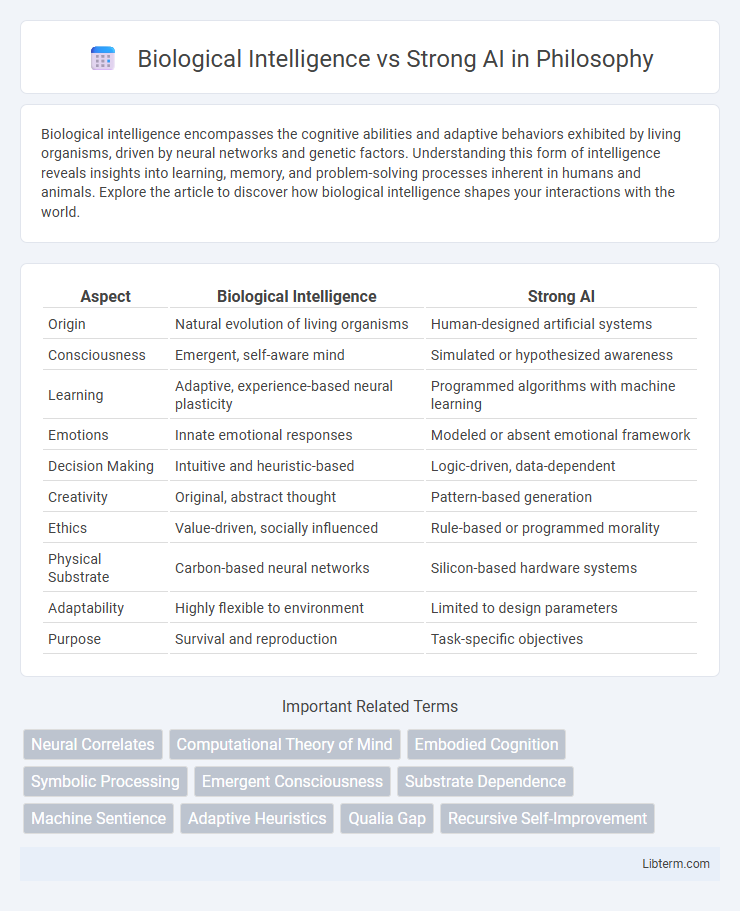Biological intelligence encompasses the cognitive abilities and adaptive behaviors exhibited by living organisms, driven by neural networks and genetic factors. Understanding this form of intelligence reveals insights into learning, memory, and problem-solving processes inherent in humans and animals. Explore the article to discover how biological intelligence shapes your interactions with the world.
Table of Comparison
| Aspect | Biological Intelligence | Strong AI |
|---|---|---|
| Origin | Natural evolution of living organisms | Human-designed artificial systems |
| Consciousness | Emergent, self-aware mind | Simulated or hypothesized awareness |
| Learning | Adaptive, experience-based neural plasticity | Programmed algorithms with machine learning |
| Emotions | Innate emotional responses | Modeled or absent emotional framework |
| Decision Making | Intuitive and heuristic-based | Logic-driven, data-dependent |
| Creativity | Original, abstract thought | Pattern-based generation |
| Ethics | Value-driven, socially influenced | Rule-based or programmed morality |
| Physical Substrate | Carbon-based neural networks | Silicon-based hardware systems |
| Adaptability | Highly flexible to environment | Limited to design parameters |
| Purpose | Survival and reproduction | Task-specific objectives |
Defining Biological Intelligence
Biological intelligence refers to the natural cognitive abilities exhibited by living organisms, encompassing perception, learning, memory, problem-solving, and adaptation to environmental changes. It is rooted in complex neural networks and biochemical processes within the brain, facilitating consciousness, emotions, and self-awareness. Unlike Strong AI, which aims to replicate human-like reasoning and understanding through computational models, biological intelligence remains an evolving, holistic integration of physiological and psychological functions.
Understanding Strong AI: An Overview
Strong AI refers to artificial intelligence systems designed to possess human-like cognitive abilities, enabling them to understand, learn, and apply knowledge autonomously. Unlike Biological Intelligence, which relies on neural processes within the human brain shaped by evolution, Strong AI is built on computational algorithms and machine learning models aiming to replicate or surpass these cognitive functions. Understanding Strong AI involves exploring advancements in neural networks, natural language processing, and reasoning capabilities that strive to achieve genuine comprehension and self-awareness in machines.
Core Cognitive Processes in the Human Brain
Core cognitive processes in the human brain, such as perception, memory, learning, and decision-making, are driven by complex neural networks and biochemical interactions that enable adaptability and abstract reasoning. Biological intelligence excels in integrating sensory inputs with emotional and contextual understanding, resulting in nuanced problem-solving and creativity. Strong AI aims to replicate these processes through artificial neural networks and algorithms, but current models lack the self-awareness and flexible cognition inherent in human intelligence.
Architecture and Algorithms of Strong AI
Strong AI architecture is designed to emulate human cognitive processes using advanced neural networks and machine learning algorithms that enable autonomous learning and reasoning. Unlike biological intelligence, which relies on complex biochemical networks, Strong AI leverages symbolic reasoning, deep learning, and reinforcement learning frameworks to process and generate knowledge. These algorithms facilitate adaptive behavior and decision-making, aiming to achieve general intelligence comparable to human cognition.
Learning and Adaptation: Brain vs Machine
Biological intelligence exhibits unparalleled learning and adaptation capabilities through neuroplasticity, enabling the brain to rewire itself and improve continuously based on experience. In contrast, strong AI relies on advanced algorithms and vast datasets to simulate learning and adaptation but lacks the inherent self-modifying flexibility of the human brain. While machines excel in processing speed and pattern recognition, biological systems integrate emotional and contextual understanding, enhancing problem-solving and creativity in dynamic environments.
Consciousness: Human Perspective vs Artificial Representation
Biological intelligence exhibits consciousness characterized by subjective experience, self-awareness, and emotional depth rooted in neural processes of the human brain. Strong AI aims to replicate this consciousness through artificial representation, employing advanced algorithms and neural networks to simulate awareness and reasoning without true experiential qualia. The key difference lies in biological consciousness emerging from organic brain activity, whereas artificial consciousness remains a functional model lacking genuine subjective experience.
Problem-Solving Approaches in Biology and AI
Biological intelligence solves problems through adaptive learning, neural plasticity, and parallel processing in the brain's complex network of neurons, enabling flexible decision-making and pattern recognition. Strong AI relies on algorithmic logic, computational models, and symbolic reasoning to replicate human-like problem-solving abilities, often using structured data and rule-based systems. While biology adapts through evolution and experience, strong AI employs machine learning techniques and artificial neural networks to simulate cognitive functions.
Creativity and Emotional Intelligence Compared
Biological intelligence exhibits superior creativity and emotional intelligence due to the brain's complex neural networks and adaptive emotional processing. Strong AI, while capable of simulating problem-solving and pattern recognition, lacks genuine emotional understanding and the spontaneous originality inherent in human cognition. Advances in affective computing are bridging some gaps, yet AI's creativity remains algorithmically constrained compared to organic biological processes.
Evolutionary Constraints vs Computational Limits
Biological intelligence develops through evolutionary constraints that optimize cognitive abilities within the bounds of genetics, neural architecture, and energy efficiency. In contrast, strong AI faces computational limits imposed by hardware capabilities, algorithmic complexity, and data processing speeds. Understanding these distinctions highlights the potential and challenges of replicating human-like intelligence in machines versus naturally evolved biological systems.
Future Prospects: Collaboration or Competition?
Future prospects of Biological Intelligence and Strong AI emphasize a dynamic interplay between collaboration and competition, with advancements in neurotechnology and machine learning fostering hybrid intelligence systems that leverage the strengths of both. Innovations in brain-computer interfaces and cognitive computing suggest a trend toward synergistic partnerships enhancing human cognition and AI capabilities. However, ethical considerations and technological rivalries may also drive competitive developments impacting the trajectory of intelligence augmentation and autonomy.
Biological Intelligence Infographic

 libterm.com
libterm.com